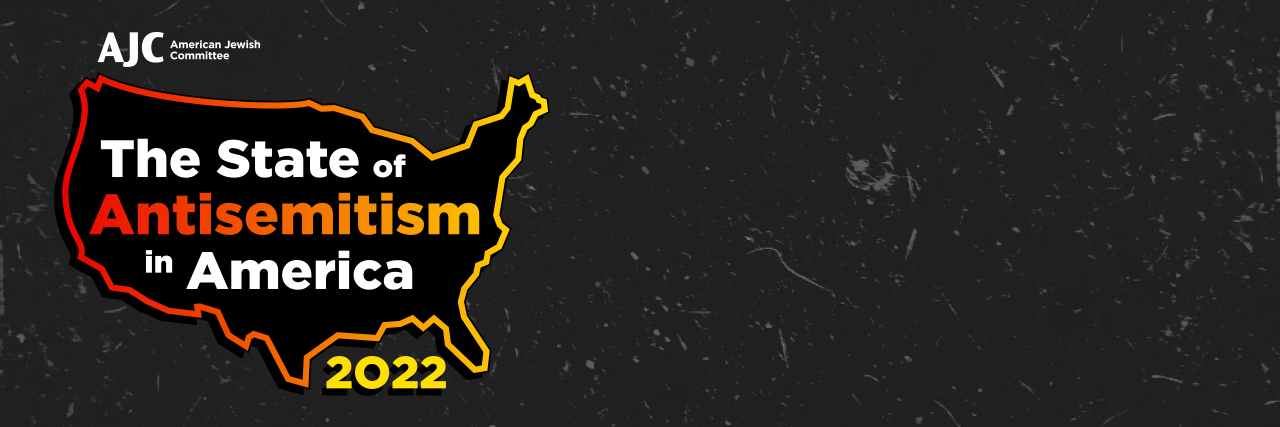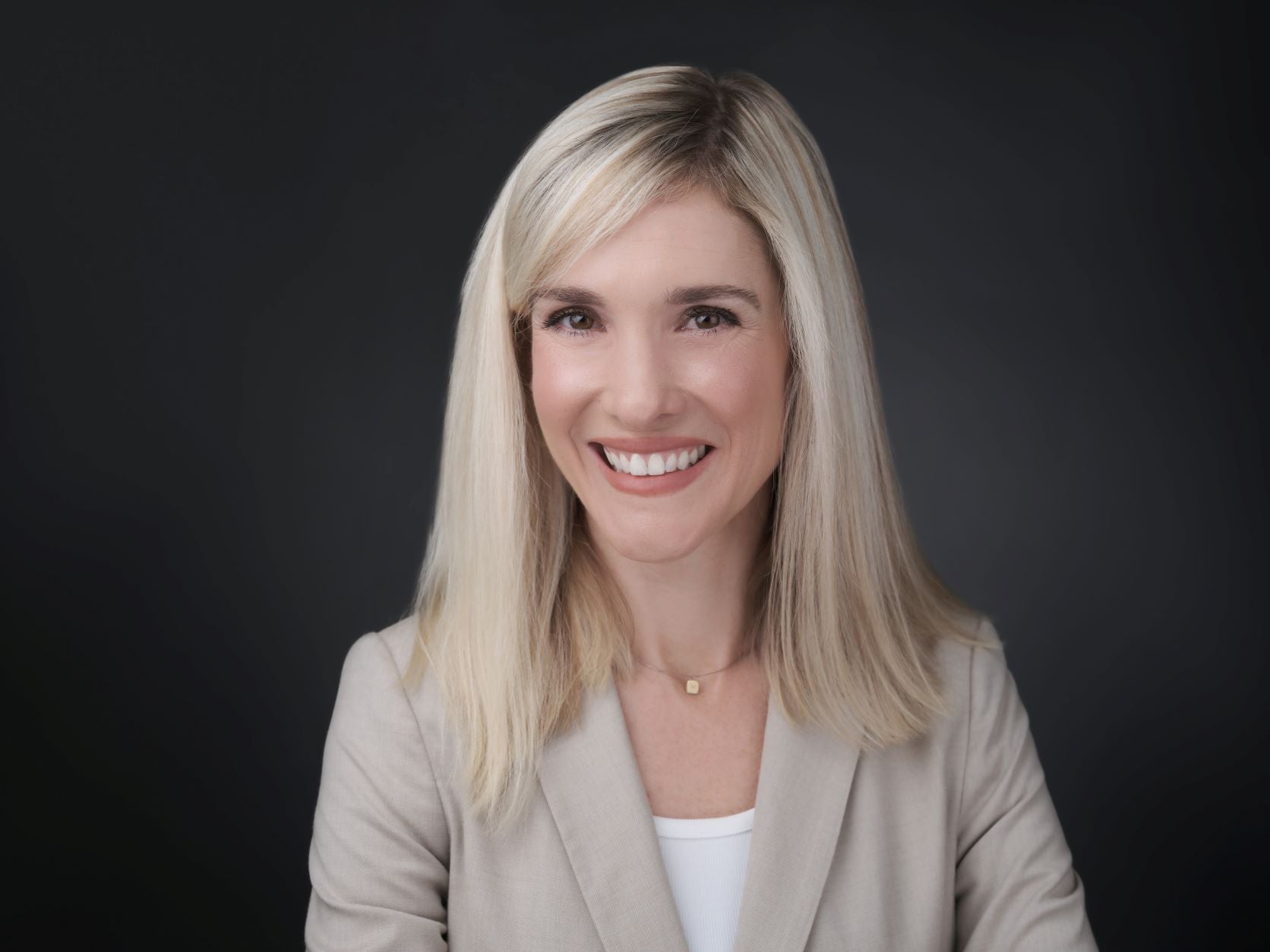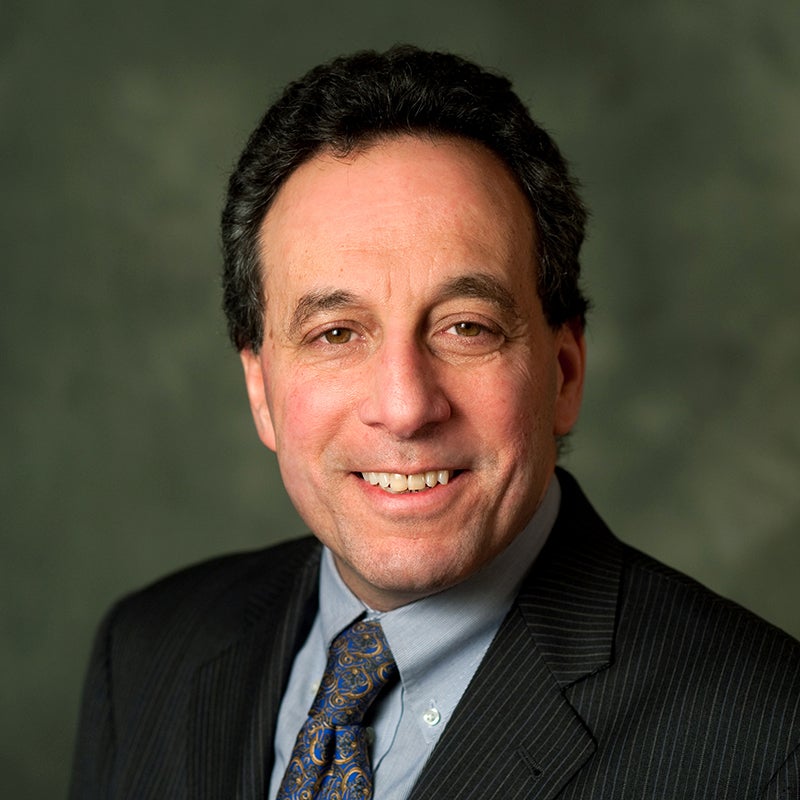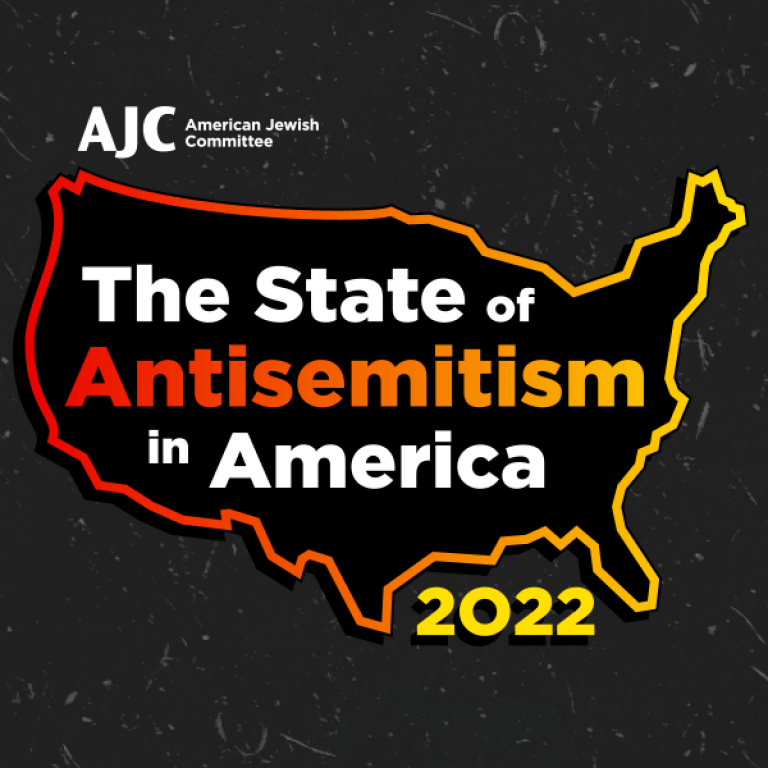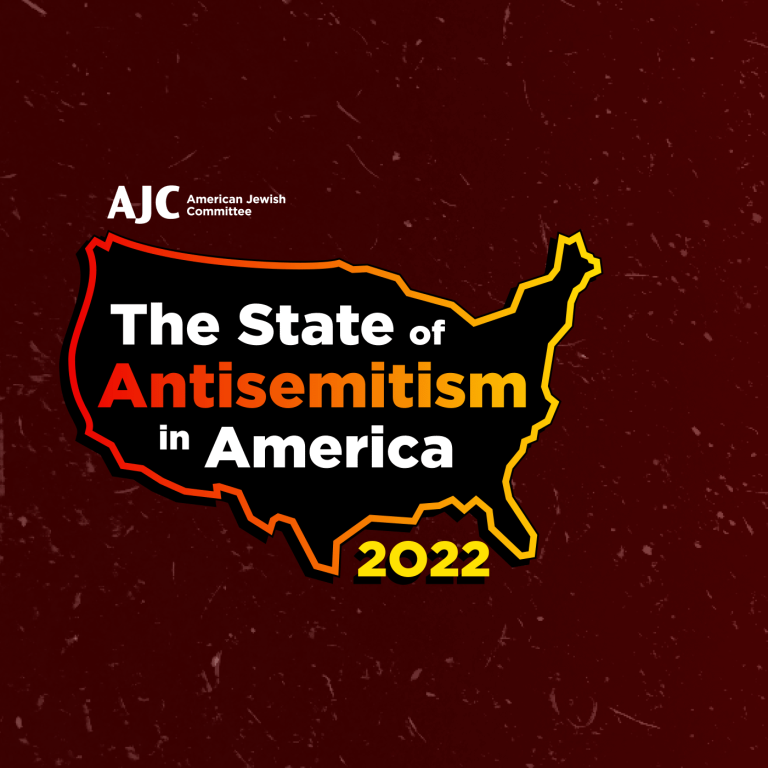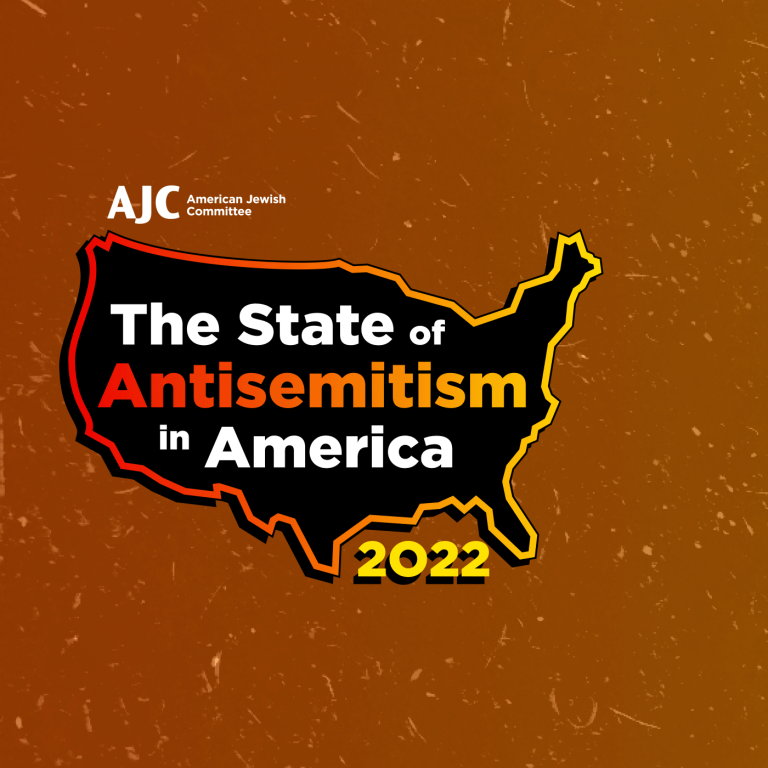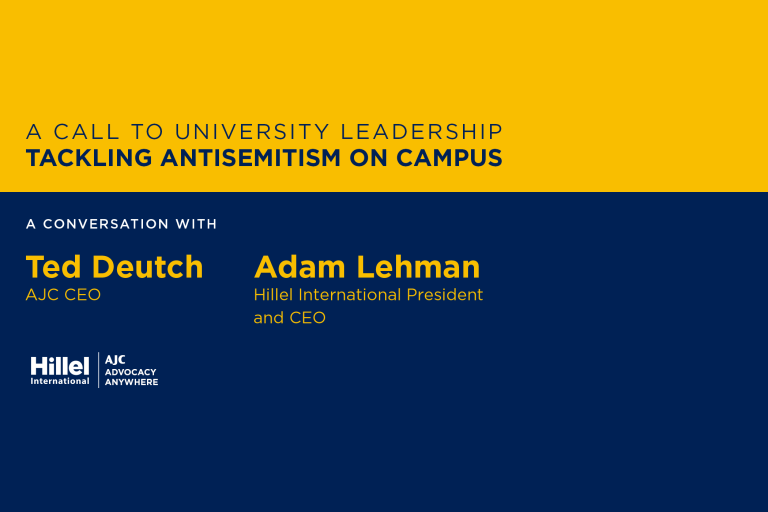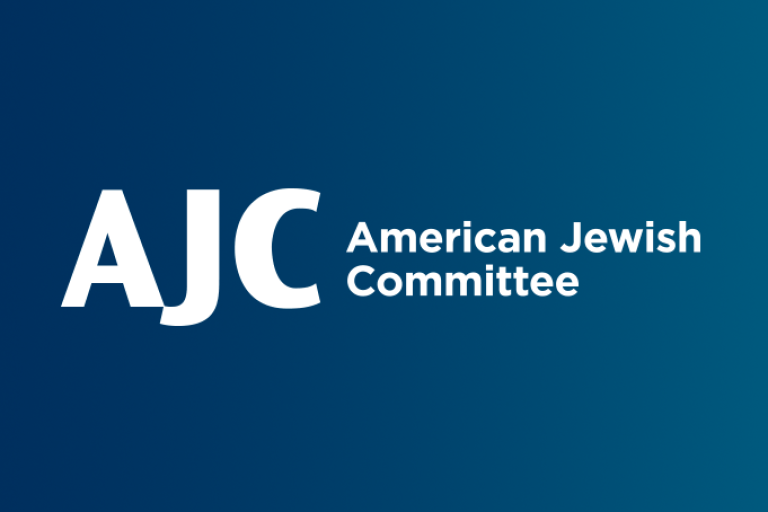April 14, 2023
American Jewish Committee (AJC) initiated in 2019 a survey of American Jews focused exclusively on antisemitism in the United States and, in 2020, began a parallel survey of the general U.S. adult population. Although AJC, the global advocacy organization for the Jewish people, had polled Jews in the U.S. for decades, the Tree of Life synagogue massacre in Pittsburgh in October 2018, the deadliest attack on Jews in U.S. history, prompted a new approach and the launch of what has become AJC’s State of Antisemitism in America report.
The findings of AJC’s State of Antisemitism in America report show the myriad of ways antisemitism in America affects the lives and actions of Jews and compares those findings to how the American general public perceives the threat.
The mainstreaming of antisemitism in American society continued in 2022. The year began with an armed individual holding a rabbi and three worshippers hostage on Shabbat in Congregation Beth Israel, a synagogue in Colleyville, Texas. Towards the end of the year, a series of blatantly antisemitic rants by rapper Kanye West, also known as Ye, and comments on and offline by NBA star Kyrie Irving, were vastly amplified online and through social media.Throughout 2022, attacks on Jews, antisemitic comments by sports and entertainment figures, and other incidents, some of them violent, contributed to wariness in Jewish communities across the country.
The report, based on parallel surveys of the American Jewish and general public, was conducted for AJC, a nonpartisan organization, by the independent research firm SSRS. National representative samples of 1,507 Jewish adults and 1,004 general population adults, 18 or older, were interviewed in the fall of 2022. The full methodology report is available here.
ANTISEMITISM IN THE U.S. IS PERSONAL
No Jew should ever feel unsafe anywhere in the U.S. Yet, for many American Jews, antisemitism is not purely a communal or national problem; it is deeply personal. Indeed, 38% of all Jews surveyed reported they have altered their behavior at least once in the past year due to fears of antisemitism. Among them, 27% avoided posting content online that would enable others to identify them as Jewish or reveal their views on Jewish issues, 23% avoided wearing or displaying things that might enable others to identify them as Jewish, and 16% avoided certain places, events, or situations due to concerns about their safety as Jews.
Many American Jews are coming into direct contact with those perpetrating hatred against them. Overall, 26% say they have been the target of antisemitism, either by an in-person antisemitic remark (20%), an antisemitic remark or post online or through social media (13%), or a physical attack (3%) [1]. Antisemitism is also affecting American Jews’ sense of security. 41% say the status of Jews is less secure than a year ago, a ten percentage-point increase from 31% in 2021. A rise in antisemitic attacks and violence were the reasons cited by 27% of those who said they felt less secure, up from 20% in 2021. Only 4% in 2022 say the status of Jews in America is more secure than a year ago when 11% said the same.
Moreover, while 73% of U.S. Jews affiliated with synagogues and other Jewish institutions say they generally feel safe when attending them, one in five (19%) do not because of antisemitism.
Fifty percent of the affiliated respondents report that security at the synagogues and other Jewish institutions they attend has increased in the past two years.
This sense of insecurity resonated in Jewish communities across the country during and immediately after the Colleyville attack. Of the 54% who had heard a lot or some about the hostage-taking crisis, the majority say it made them feel a great deal (18%) or a fair amount (33%) less safe as a Jewish person in the United States. Just over a third (36%) say it made them feel a little less safe.
DIFFERING PERCEPTIONS OF THE PROBLEM
In 2022, nine in 10 American Jews (89%), compared to 68% of U.S. adults, say antisemitism is a problem in the U.S. The number of U.S. adults that say antisemitism is a problem increased from 60% in the previous year.
A larger divergence exists on whether antisemitism has increased over the past five years. 82% of Jews and 47% of U.S. adults say it has increased and of those, 43% of Jews and 16% of U.S. adults say it has increased a lot.
For the general population, education is an influential factor. 52% of those who have a college degree say antisemitism has increased over the past five years, compared with 44% of those with less education.
ANTISEMITISM IS A SOCIETAL PROBLEM, HEIGHTENED ONLINE
Notwithstanding differing perceptions, there is a noticeable concurrence among both Jews and U.S. adults that antisemitism is a societal problem, not solely a Jewish concern. Each group was asked which statement comes closer to their views: “Antisemitism is a problem for everyone; it affects society as a whole,” or “Antisemitism is only a problem for Jews; it does not affect society as a whole.”
Online and on social media are the places where most American Jews see and experience antisemitism.
As mentioned earlier, almost three in 10 (27%) of all American Jewish respondents avoided posting content online that could identify them as a Jew or reveal their views on Jewish issues. This number jumps to 37% for young American Jews, ages 18-29, compared to 24% for those 30 and older. Two-thirds (67%) of all Jews surveyed say they saw antisemitic content online or on social media in the 12 months since the 2021 survey, including 57% who say they saw it more than once. While 13% of American Jews report being personally targeted by an antisemitic remark or post online or through social media in the past year, among younger Jews, ages 18-29, roughly one in five (19%) say the same.
When combining those who saw antisemitism online with those who were the target of antisemitism online or through social media, 69% of Jews report they have experienced antisemitism online, either by seeing it or being a target, in the past year.
For Jews who had experienced antisemitism online or on social media in the past year, 45% say it occurred on Twitter, 43% on Facebook, 19% on YouTube, 18% on Instagram, 11% on TikTok, and 21% on another platform. Most (72%) who experienced online antisemitism did not report it to the platform. Of the 28% who did report, 61% received some type of response from the platform and 39% say there was no reply at all.
The general population also is witnessing this phenomenon. Among the 36% of U.S. adults who reported personally seeing antisemitism in the past year, 82% say they saw it online or on social media.
The prevalence of antisemitism online has made the virtual communications sphere, with its limitless reach, the leading space for anti-Jewish prejudice, conspiracies, and hatred, and younger American Jews are more likely to be experiencing this form of hate.
YOUNGER JEWS EXPERIENCE ANTISEMITISM AT HIGHER RATES
Notably, young Jewish adults are expressing greater concerns than those aged 30 and older about their experiences with antisemitism and physical safety. Among those who experienced antisemitism online, younger Jews (26%) were more likely than older ones (14%) to say these online incidents made them feel physically threatened.
Generally, younger Jews are more likely than older cohorts to experience hate online. Eighty-five percent of those ages 18-29, compared to 64% of the 30 or older group, reported they experienced antisemitism online or on social media.
Younger Jews were also more likely to be the target of antisemitism. 30% report being targeted by an antisemitic remark in person, compared to 17% of the 30 or older group; 19% report being targeted by an antisemitic remark or post online or through social media, compared to 11% of those 30 or older; and 9% report an antisemitic physical attack, compared to 1% of those 30 or older.
Moreover, among the 18-to-29 year-old cohort who heard a lot or some about the Colleyville hostage crisis, 67% felt a great deal or a fair amount less safe, compared to 47% of those 30 and older.
To further understand the impact of antisemitism on young Jewish adults, new questions in the 2022 survey probed their experiences on American college and university campuses.
While the majority who are currently students or attended higher education institutions in the past two years have not experienced any exclusion, 12% report they felt or were excluded from a campus event or group because they are Jewish and 14% say they felt or were excluded because of their assumed or actual connection to Israel.
In addition, just over a third, 36%, say they have avoided or experienced at least one of the following on campus: 26% experienced difficulty taking time off from class or were told they could not miss class for Jewish holidays; 21% avoided wearing or carrying things that identify them as Jewish; and 18% say they have felt uncomfortable or unsafe at a campus event because they are Jewish.
CHALLENGES IN THE WORKPLACE
In 2022, U.S. Jews were asked for the first time in an AJC survey about their experiences in their places of work. For those employed full-time or part-time, 33% reported they have avoided or experienced at least one of the following issues in the past year: 22% avoided expressing their views on Israel; 10% avoided wearing or displaying something that would identify them as Jewish; 10% had trouble taking time off work for the Jewish holidays; and 8% felt unsafe or uncomfortable in their workplace because of their Jewish identity. While these percentages are low, the fact that almost one in 10 American Jews feel unsafe or uncomfortable at work because they are Jewish is disconcerting.
RISING AWARENESS AMONG GENERAL POPULATION
While the word “antisemitism” is still not as commonly known in the American lexicon as it should be, there continues to be measurable progress in awareness. 69% of U.S adults surveyed say they have heard the term “antisemitism” and know what it means, 22% have heard the term but are unsure of what it means, and 9% say they have never heard of the term. In 2021, 16% had never heard of the term “antisemitism,” indicating a modest uptick in awareness over the past year.
Americans in general are also witnessing antisemitism at a significant rate. While more than one in three (36%) U.S. adults say they personally witnessed an antisemitic incident in the past year, one in five (22%) say they saw it more than once.
Education is key to building awareness. 82% of U.S. adults with a college degree have heard the term and know what it means, compared with 71% of those with some college education and 55% of those with a high school diploma or less education. Encouragingly, however, 55% of those who have a high school degree or less education have heard the term “antisemitism” and know what it means, up from 42% in 2021.
HOLOCAUST KNOWLEDGE
To further probe awareness of antisemitism, the general U.S. adult population survey asked for the first time a series of questions about the Holocaust: when did it happen, how many Jews were killed, what was Auschwitz, and how Adolf Hitler became chancellor of Germany. Only 26% answered all four questions correctly, while 30% got three correct and 25% had two correct.
Most U.S. adults know when the Holocaust happened and are familiar with Auschwitz, but fewer are cognizant of the number of Jews murdered and how Hitler came to power in Germany. The vast majority, 85% of the respondents, accurately described Auschwitz as a concentration and death camp for Jews, and about three-fourths (76%) knew that the Holocaust occurred between 1930 and 1950.
But only 53% answered correctly that approximately six million Jews were killed in the Holocaust, while 20% say they were not sure, and 11% say more than 12 million. 39% correctly say Adolf Hitler became chancellor of Germany through a democratic political process, but 24% chose not sure, and a third (34%) say he came to power by violently overthrowing the German government.
Overall, 34% of those with a college degree and 28% of those who have completed some college answered all four questions correctly, compared with just 17% of those who have a high school degree or less education.
Importantly, the survey found that those who know about the Holocaust are more likely to recognize antisemitism. U.S. adults who answered three or all four Holocaust questions correctly are more likely than those who answered fewer to know what antisemitism is (85% vs. 48%). Those with more Holocaust knowledge are also more likely than those with less Holocaust knowledge to say antisemitism has increased in the past five years (53% vs. 39%) and that it is a serious problem in the U.S. (72% vs. 63%).
On the question of how many Jews were killed, 42% of those with a high school degree or less education correctly answered approximately six million, compared with 62% of those who have completed at least some college and 59% of college graduates. Additionally, 76% of those who have a high school degree or less education correctly answered the question on Auschwitz, compared with 89% of those who completed some college and 91% of college graduates.
KNOWING AND ENGAGING WITH JEWS
In 2022, U.S. adults were asked for the first time how much they know about Judaism. 57% say they know a lot (11%) or some (46%), 34% say they do not know much, and 10% know nothing about Judaism.
However, two-thirds, 66%, of U.S. adults, say they personally know someone Jewish. Unsurprisingly, this personal connection seems linked to a heightened perception of antisemitism as a problem and a greater awareness of antisemitic incidents.
For example, 78% of those who know someone who is Jewish have heard the term “antisemitism” and know what it means, compared with 51% who do not know someone who is Jewish. 73% who know someone who is Jewish say antisemitism is a problem in the U.S. today, compared with 59% who do not know anyone who is Jewish. And 52% of those who know someone who is Jewish, compared to 37% who do not, say antisemitism in the U.S. has increased over the past five years.
Those who know someone who is Jewish are more likely to have seen an antisemitic incident than those who do not know anyone who is Jewish (42% vs. 26%). They are also more likely to recognize conspiratorial antisemitism than those who do not know Jews, viewing the phrase “Jews control the media,” as antisemitic (70% vs. 59%).
DELEGITIMIZING ISRAEL
U.S. adults are aligned with American Jews in viewing the statement “Israel has no right to exist” as antisemitic. Roughly nine in ten respondents across both surveys – 90% of U.S. adults and 87% of U.S. Jews – agree that delegitimizing the State of Israel is unquestionably antisemitic.
Furthermore, Americans, in general, are about as likely as American Jews to view the Boycott, Divesting, and Sanctions (BDS) movement, which seeks Israel’s destruction, as antisemitic or having antisemitic supporters. Among the 65% of American Jews familiar with the BDS movement, 39% say it is antisemitic and 47% say there are some antisemitic supporters. Similarly, among the 35% of U.S. adults who say they are familiar with the BDS movement, the majority say the movement is mostly antisemitic (38%) or has some antisemitic supporters (50%).
GOVERNMENT RESPONSES TO ANTISEMITISM, DECLINING JEWISH CONFIDENCE IN LAW ENFORCEMENT
AJC, a nonpartisan organization that does not endorse or support candidates for elective office, asked American Jews how they view the responsiveness of government officials to antisemitism. Almost half (48%) approve of how President Biden is responding to antisemitism in the U.S., compared to 34% who disapprove. More than half of American Jews (56%) disapprove, and 22% approve, of Congress’s response to antisemitism. Forty percent of American Jews approve of how state and local governments are responding to antisemitism, compared to 37% who disapprove.
Concerns about security and safety are a factor when looking at how law enforcement responds to victims of antisemitic attacks and increased security at synagogues and other Jewish institutions. While a majority of American Jews, 63%, continue to say law enforcement is very (13%) or somewhat (50%) effective in responding to the security needs of the Jewish community, more than one-third, 35%, do not. These figures are similar to 2021. Significantly, the percentage of those who say law enforcement is effective in responding to the security needs of Jews has been declining over the past four years. When AJC first asked the question in 2019, 81% of American Jewish respondents said law enforcement was effective. [2] Among Orthodox Jews surveyed in 2022, 65% say law enforcement is effective in addressing their needs, a sharp decrease from 81% in 2021; the results are relatively unchanged for other denominations and secular Jews.
In reality, law enforcement’s ability to follow up on antisemitic incidents depends, in part, on reporting by victims or witnesses, and, for a variety of reasons, reporting remains low. Among the 26% of American Jews who were the personal target of antisemitism in at least one of three contexts (physical attack, remark in person, or online/social media post) once or more in the last 12 months, just 6% reported the incident, or any of the incidents if there was more than one, to the police.
Similarly, only 7% of U.S. adults who say they have personally witnessed antisemitic incidents over the past 12 months reported them to the police, 4% reported the incident to a Jewish organization, 5% reported it to another authority or organization, and 3% reported it to a social media company.
TAKING ANTISEMITISM SERIOUSLY
Antisemitism must continue to be taken seriously. Almost half of American Jews (48%) and more than a third (34%) of the general population said antisemitism is taken less seriously than other forms of hate and bigotry—and almost six in ten (59%) of young Jewish adults think antisemitism is taken less seriously, compared to 45% of Jews 30 and older. 38% of American Jews and 50% of the general public said it is considered about the same as other forms of hate and bigotry.
A PATH FORWARD
In sum, the reality of significant percentages of American Jews reporting that antisemitism is affecting their daily lives and behavior is a sad commentary on the state of American society. Elevating the national conversation on antisemitism and developing effective policies and strategies will be critical for the future of the American Jewish community – indeed for American society at large.
The mode of the survey changed between 2019 and 2022. While AJC cannot make a direct comparison, the trend points to a declining confidence in law enforcement to protect the Jewish community.
Education levels, knowing Jews, and being knowledgeable about the Holocaust all contribute to a greater understanding of the problem of antisemitism in the United States today. While we must continue to enlist policymakers, law enforcement, and prosecutors—those with a duty to protect Americans and counter antisemitism—we must ensure all American society is equipped to understand, respond to, and prevent antisemitism, as detailed in AJC's Call to Action Against Antisemitism.
Social media companies must do more to curb the exponential spread of antisemitism and be accountable if their algorithms are proven to promote harmful content. Educators must educate the next generation of American students on who Jews are and what antisemitism is. The media has a responsibility to accurately report on antisemitism and raise awareness. And coalition partners, and members of America’s diverse religious and ethnic communities, also must speak out.
After all, antisemitism is not only an attack on Jews but an assault on the core values of any democratic and pluralistic society. Hate in general has been on the rise in America, and the year 2022 saw an increase in hate incidents and crimes targeting Asian Americans, African Americans, Latino Americans, Muslim Americans, and other groups.
Assuaging the wariness and fears of American Jews and other minority communities will depend on the progress made by the new White House Interagency Group to Counter Antisemitism, Islamophobia, and Related Forms of Discrimination and Bias. The group’s first order of business is to develop a national strategy to counter antisemitism in the U.S.
Such steps cannot come soon enough. The year 2023 has begun with violent antisemitism, including an individual tossing a Molotov cocktail at a New Jersey synagogue, a lone gunman on a shooting spree in a Jewish neighborhood in Los Angeles, and an individual arrested for threatening to kill Jewish lawmakers in Michigan.
Producing a first-ever U.S. government plan to combat antisemitism in the United States is a worthy and necessary goal for 2023.
______________________
[1] 3% is a weighted figure reflecting 48 American Jews who reported that they had been physically attacked over the past year, out of an overall sample of 1,507.
[2] The mode of the survey changed between 2019 and 2022. While AJC cannot make a direct comparison, the trend points to a declining confidence in law enforcement to protect the Jewish community.
Holly Huffnagle is AJC U.S. Director for Combating Antisemitism and Kenneth Bandler is AJC Director of Media Relations.
